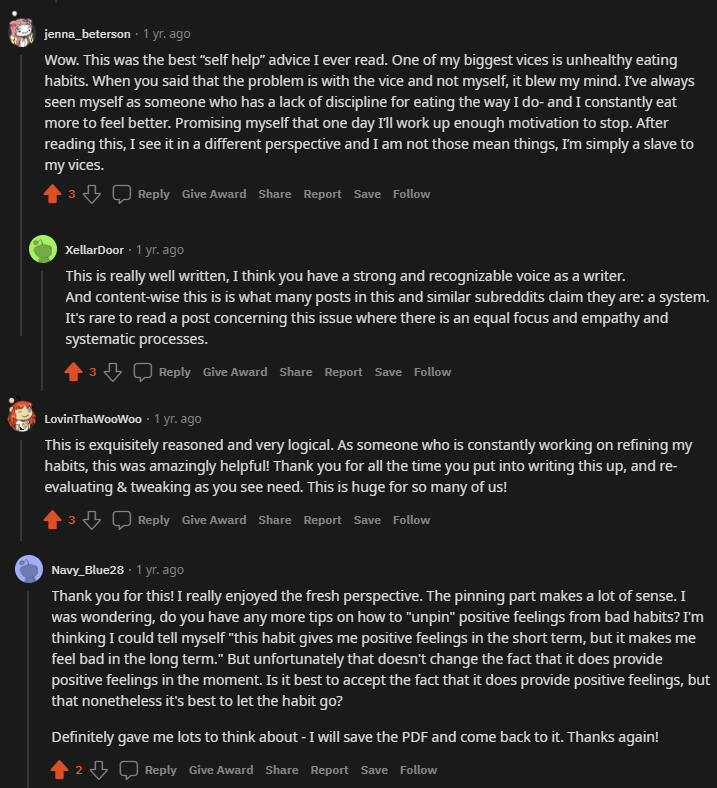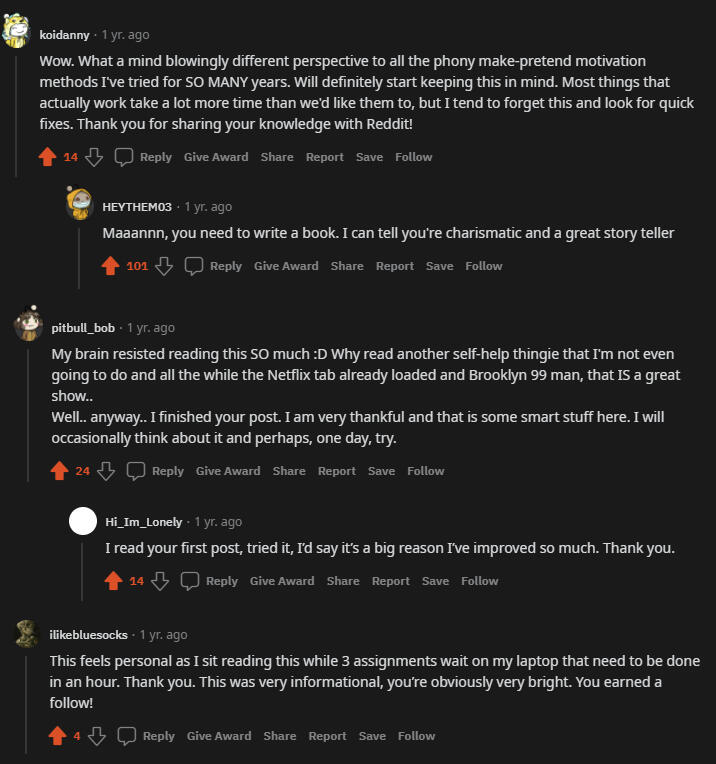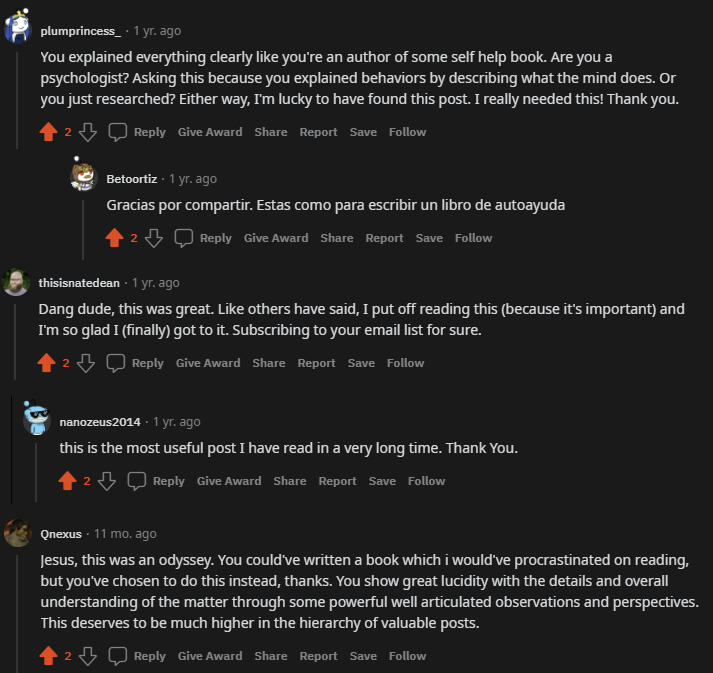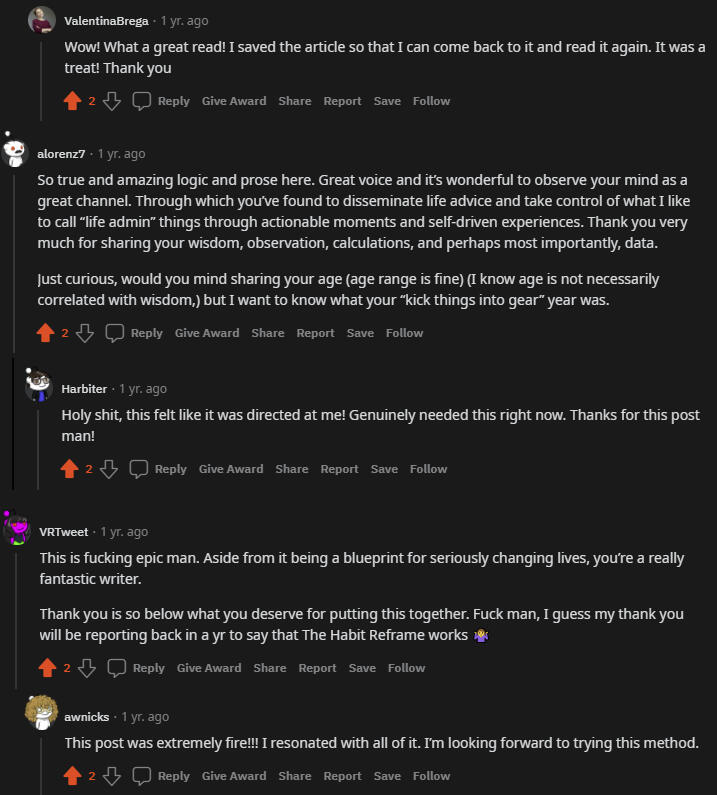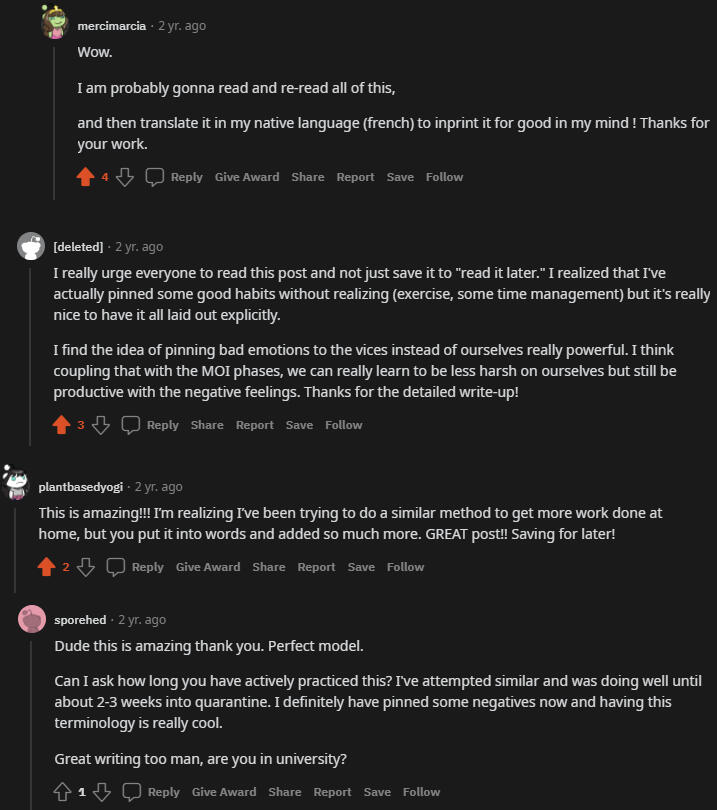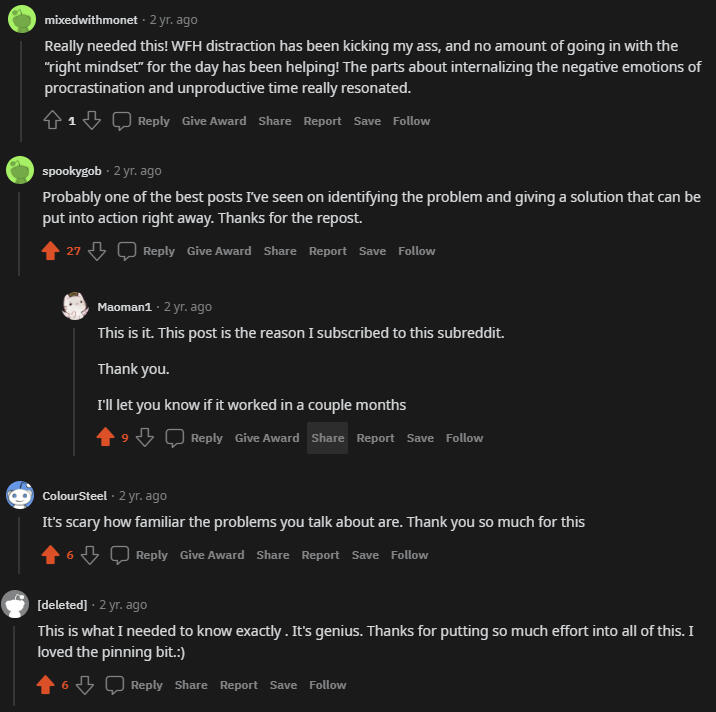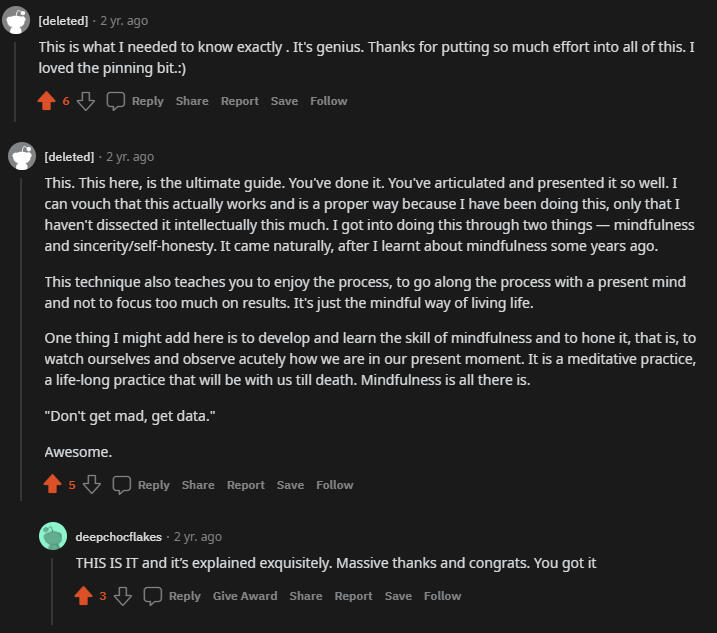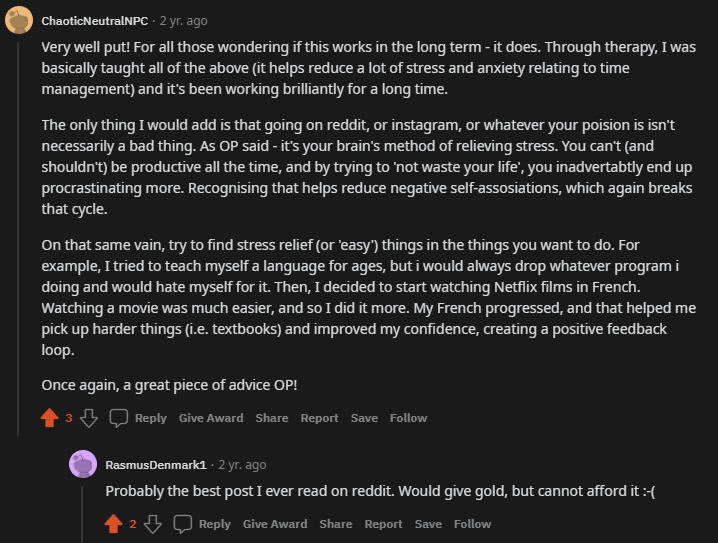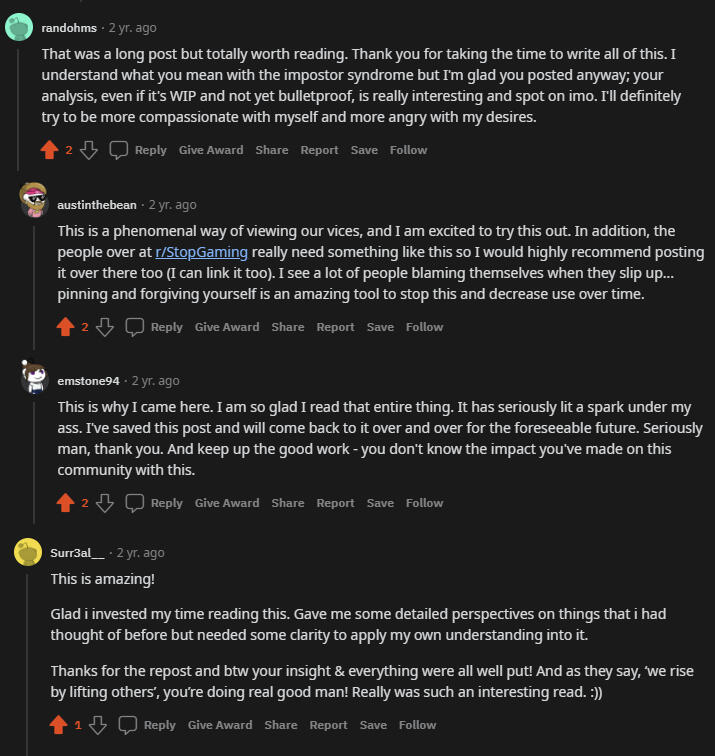Here's the cleaned-up, PDF version of the method I posted.
It'll get you to end bad habits and start up on new good ones.
Note: by getting the book, you'll also be joining my Substack. You'll get the occasional message ONLY from me—no spam, no trash.
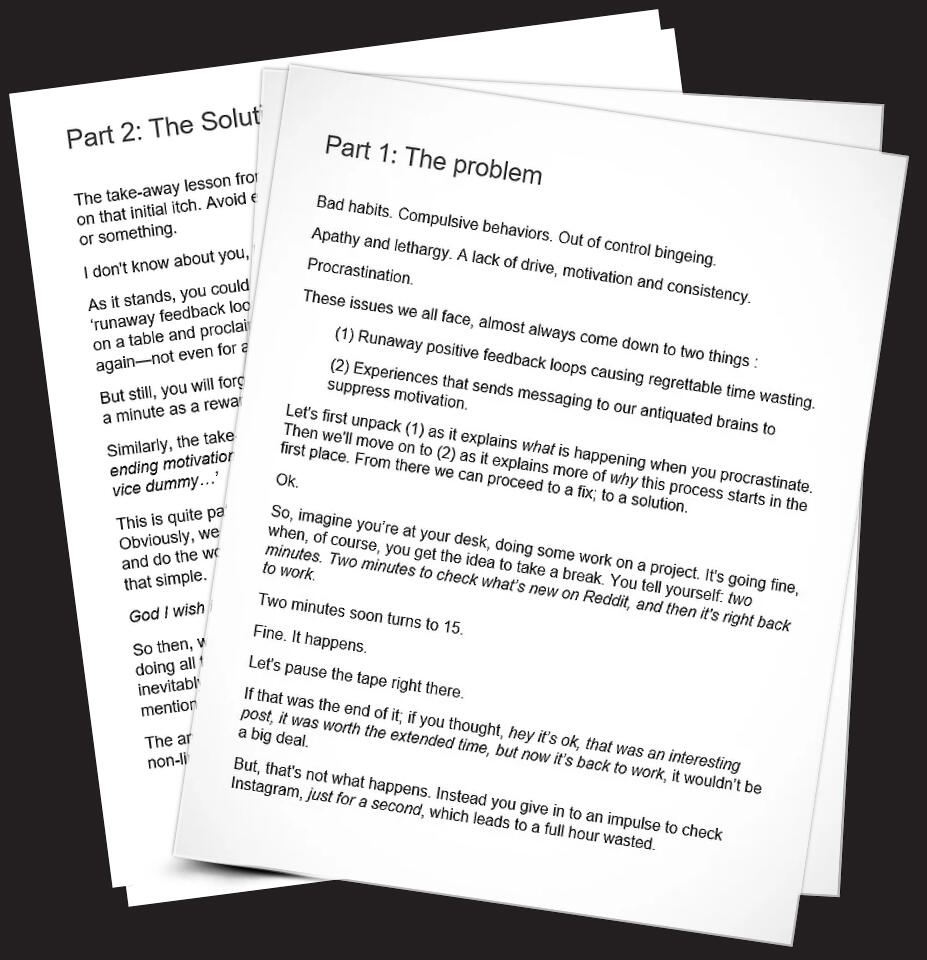
Not sure if it's worth the read? Here are some comments it got when I posted the second draft to Reddit...
A Breakthrough in Habit Formation
Zero motivation.Zero ability to focus and concentrate deeply.Zero ability to be consistent with good habits.Zero self-esteem and self-trust.Zero ability to not go on that app for the 4th time in 10 minutes.Can you relate?And more importantly, do you want to do finally something about it?For years, destructive habits held me back.I was in a low place, trapped in cycles of procrastination, avoidance, and low self-esteem.That was me, unable to get any momentum going.So it’s surprising to me that for the past 3 years, I’ve been posting self-improvement advice and methods to Reddit. The number one feedback I get? “It’s like you pulled the words from my mouth. It’s like you know my struggles more than anyone else.”What changed? We will get to that in due time.But a mentor told me that your problems make you uniquely qualified to solve the problem.The pain and struggle I endure again and again. It was like every time I pulled my head out of the water, my vices dragged me back in. I was drowning in a sea of avoidance and easy dopamine hits.So yes, I know your problem. I know your problem because I had your problem.I can help you with your problem. And it helped me to overcome over a decade of mediocrity (at best) and depression and underperformance at worse.So how did I overcome procrastination and lack of motivation?For one, it was not using any of the advice and tricks found in self-help books.Sure, they have their place, but maybe like me, your experience is that they help you but soon you find yourself back where you started. And breaking out of that cycle (for good) is exactly what I can help with.You know how some days you are super productive, and feel like you’re on top of the whole world. And you tell yourself, wow if every day is like this, I would be able to achieve all my goals.But what ends up happening? You falter and go back to your old ways. If that was it, it wouldn’t be so bad, but you end up hating yourself. As you will soon learn, that is a recipe for disaster.So what was my journey like? How did I uncover something that actually worked?I found a book. A book that was not really written for me.It was late 2012. During another one of my nights of aimless browsing, I came across a post that caught my attention. Someone raving about how they managed to quit their decades-long smoking addiction just by reading a single book.I can remember thinking,“C’mon. How could a collection of words compel anyone to end a bad habit—let alone the most notoriously difficult one to quit?”Yet, as I poked and prodded around the internet, I came across more and more hype and success stories. A tiny seed of an idea was planted in my mind.If so many people were claiming that this book miraculously made them quit smoking... maybe there was something there. Maybe I could bend and tweak the core concept and use it to end my own set of bad habits.It was a long shot—like reading a yoga book to improve a golf swing—but I had nothing to lose. I soon found out to fix something that was was never fixed before—my procrastination—I needed to try something I hadn’t. And the best solutions can often be in the most unlikely of places."The Easy Way to Stop Smoking" by Allen Carr can be summarized by one simple premise: Smokers don’t smoke because of the reasons they think they do.It’s not because it brings them certain benefits like pleasure and stress reduction. They smoke for the sole reason of relieving the discomfort caused by... the last time they lit up.That‘s the book. The entire thing is dedicated to disproving all the reasons to smoke; all the benefits the smoker assumes they have to “give up” and “sacrifice” by quitting.Good taste, stress relief, improved concentration, social lubrication... one by one, chapter by chapter, these beliefs are dismantled and replaced with the truth: Smoking does two things. It causes the discomfort of nicotine withdrawal. It‘s also the only thing that can cure that discomfort.So curing the discomfort leads to more discomfort, so you smoke again for relief, but then more discomfort, and so on in an ever-tightening closed feedback loop.Carr equates the “pleasure” of smoking to the act of purposefully wearing tight shoes all day because we enjoy the “pleasure” of taking them off. The book gets pretty repetitive, but that‘s by design. It brainwashes you—in a good way—that smoking is the most useless, irrational, and downright idiotic behavior imaginable.I began noticing similar patterns in my own behavior. I’d recall my own urgent irrational impulses to consume a vice—say scrolling through Reddit at 1 a.m.—despite the panic and stress of a looming deadline.According to Carr’s theory, I wasn’t procrastinating because I was a careless slacker, or else a bad and lazy person. And it wasn’t because I loved the content or found it useful. I was simply stressed and anxious... and my tech vices were unmatched at providing relief from those bad feelings.So I’d indulge as an escape, but that would lead to more stress and anxiety, so more cravings and compulsions for relief and so on.I was getting stuck in the same feedback loop that hooks smokers in (which I‘ve dubbed “the vice feedback loop” to include all vices).You feel a bad feeling (e.g. guilt, stress) and you indulge in a vice to ease the bad feeling. And as much as it helped me, this one book was not enough. It was a start, and it showed me the light at the end of the tunnel, a way towards a solution that had not been visible to me previously.I would love to say that the book solved all my problems, but I still got caught in cycles of procrastination. The good thing was I never seemed to return back to where I was before I read that 80’s smoking book.Having discovered that there was perhaps another way, I kept going at it, prototyping my own “methods” to break my unwanted habits. I read books and research on mindfulness and compassion. I read sobriety memoirs and tales of depression.The things I learned from these overlooked subjects provided me with a foundation that was vastly different from where I was.With a solid foundation, the conventional self-help books that previously were not of great help before began to have a better impact. Things like time boxing, which I used to not be able to stick to, became possible.
And now, after years of trial and error, exploration, and growth, I am excited to share with you the culmination of my journey—The Habit Reframe Method.Are you tired of feeling like your habits are holding you back?Maybe you've tried to make changes in the past, only to find yourself slipping back into old patterns time and time again. Trust me, I get it.Breaking free from destructive habits can feel like an uphill battle, but I'm here to tell you that there's hope – and it comes in the form in the wisdom I’ve gathered and tested in the Habit Reframe method.The Habit Reframe is a short PDF, readable in one sitting that will introduce you to a new approach to Habit Change.It's not about quick fixes or one-size-fits-all solutions.I’m sorry if you read this far expecting a miracle cure, but the truth is there are no quick fixes if you want to fix your bad habits.Instead, it takes a holistic approach to habit change that takes into account the complexities of human behavior. And that is where true change happens.At its core, the Habit Reframe Method is all about reshaping your relationship with your habits. It's about understanding why you do what you do, and learning how to make lasting changes that stick.You will get tools and techniques like pinning and setting up iterative work sessions. Tools likeThe Power of PinningOne of the concepts in Habit Reframe Method is something called "pinning."Now, I know what you're thinking – what is pinning and what does it have to do with breaking bad habits? Pinning is all about associating specific emotions with your habits.By consciously linking your behaviors to how they make you feel, you can start to reshape your desires and motivations.Think about it like this: when you indulge in a bad habit, how does it make you feel afterwards? Chances are, you're left with a sense of guilt, regret, or even shame. By pinning those negative emotions to the habit itself, you can start to weaken its hold on you.On the flip side, when you engage in positive habits, like exercising or working on a creative project, how do you feel? Probably pretty good, right? By pinning those positive emotions to the habit, you can strengthen your desire to keep doing it.You will always learn that instead of beating yourself up for slipping up, the Habit Reframe Method encourages you to learn from your mistakes and move forward with kindness and grace.Plus, it's flexible and iterative, meaning you can adapt it to fit your own unique needs and circumstances. There's no one-size-fits-all solution here – just a roadmap to help you navigate the ups and downs of habit change at your own pace.You'll learn to trust and be kind to yourself again, and to believe in your ability to create the life you've always dreamed of.Download the PDF now and start breaking your bad habits for good. Not yet convinced it’s possible? Take a look at the feedback that the Habit Reframe Method received when I posted an older version of it on Reddit.Download the PDF now.
I'm here to
→ register for the Group Accountability Program
→ get the book
→ learn more or contact you
Why do you use Telegram to send the PDF?Telegram provides for me an ideal way to transfer a PDF file directly to you.I use Telegram since, unlike WhatsApp and Messenger, it's not owned by Facebook. Your privacy is ensured while your data is kept from advertisers.
⠀What if I don't have an account?If you're on mobile, it's super quick to install the app and create an account. Get it here for iPhone and here for Android.
⠀What if I can't make a Telegram account?No stress. Shoot me an e-mail (simon@simond.me) and I'll send it to you as an attachment.
There's a book?No, not yet... but I'm working on it :)My goal is to self-publish a full book, expanding on the ideas of the Habit Reframe Method.If you want me to keep you posted (and receive sweet a discount coupon), drop your email in the form below.If you have any questions or concerns, shoot me a message.- Simon ㋛
About Habit ReframeChance are you struggle needlessly with self-control and a lack of motivation. The Habit Reframe empowers you to stop procrastinating while unlocking your drive to stay consistent with good habits. The result: a productive, happy and fulfilling life.The Habit Reframe brand was founded by Simon D. in 2020. It's publications and programs include:
- The Habit Reframe Method, a free ebook.
- Self-improvement articles on Reddit.
- The Group Accountability Program on Discord.Looking to connect?Write to simon [at] simond.me- Simon ㋛
© 2022 habitreframe.com. All rights reserved.
OR
→ Why Telegram? I don't have that app.
→ I'm actually here for something else.
→ I don't use any of those, please email it to me.→ I'm actually here for something else.
No sweat ;)
© 2022 habitreframe.com. All rights reserved.

